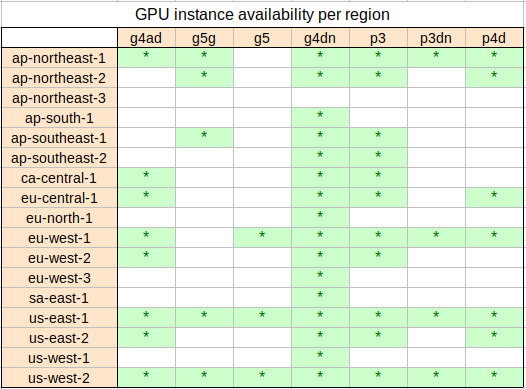CloudFormation template for mining Ethereum (ETH) crypto currency on AWS GPU-enabled EC2 instances
-
Read about the profitability on AWS mining in my article Mining Ethereum on AWS - is it worth it? first!
-
Reach out to me if you need help with any customisation, e.g. to add support for other crypto currencies, etc.
-
Login to your AWS account and have your Ethereum wallet address ready
-
Launch the stack in one or more of the cheapest regions. Sometimes spot capacity is not available in a particular region, in that case try a different one.
-
Most users should use the Default VPC template. However if your AWS account is very old and still supports EC2-Classic instances you will have to use the Custom VPC template instead and select the VPC and Subnets manually (and yes you can select the default VPC and default subnets). Do not worry - you will be prompted by the Default VPC template if this is the case.
TL;DR Start with the Default VPC template and see if it works.
You will have an opportunity to check the stack details, enter the wallet address, etc, before the stack is launched.
Not all instance types are available in all regions. Use the table below to choose the region which supports your desired instance type.
Also note that the Spot and On-Demand prices differ between the regions. The US regions are typically slightly cheaper but often have availability issues, especially on Spot. The non-US regions are a little more expensive but may have the desired instance types available more readily.
- Spins up an AutoScaling Group with Spot Instances of the specified instance types, with the most efficient attempted first (usually g5.xlarge, g4dn.xlarge, etc ...)
- Use template-eth-default-vpc.yml if you want to spin up the instances in the Default VPC (most users).
- Use template-eth-custom-vpc.yml if you have your own VPC that you want to use (advanced users). The Subnets must have direct or NAT access to the internet! Make sure that the VPC matches the Subnets selected!!
- Runs
ethminerwith the right options for mining with the ethermine.org pool upon the instance start
All right you have created the stack but no instances seem to be running. If you navigate to EC2 -> Autoscaling groups -> ethminer -> Events tab you may see this error:
Failed: Launching a new EC2 instance.
Status Reason: Max spot instance count exceeded. Launching EC2 instance failed.
AWS accounts have default limits (quotas) on some resources. You may find, for example, that your quota for
All G and VT Spot Instance Requests in a particular region is 0 and you therefore can't start any g4dn.xlarge instances.
It pays to request the quotas increase which can be done with this simple command (you can do this from the CloudShell):
export AWS_REGION=us-west-2 # Oregon
export CODE=L-3819A6DF # All G and VT Spot Instance Requests (for g5.xlarge, g4dn.xlarge, etc)
# export CODE=L-7212CCBC # All P Spot Instance Requests (for p3.2xlarge, p3dn.24xlarge or p4d.24xlarge)
export VCPUS=96 # 96 vCPUs - can accommodate e.g. 24x g4dn.xlarge or 1x p4d.24xlarge
aws --region ${AWS_REGION} service-quotas request-service-quota-increase --service-code ec2 --quota-code ${CODE} --desired-value ${VCPUS}
Choose the number of vCPU and the Quota code according to your needs.
Spot instance capacity for g4dn.xlarge instances is in short supply in the cheapest regions, even though the spot
prices are still very very low. You may have to wait for a long time to get an instance.
Interestingly the Los Angeles local zone seems to have plenty of g4dn spot capacity at the same price as Oregon, however you have to opt-in to be able to use it. Here is how (you can do this from the CloudShell):
- Opt-in to the LAX zone with:
aws --region us-west-2 ec2 modify-availability-zone-group --group-name us-west-2-lax-1 --opt-in-status opted-in - Create new default subnets in the 2 LAX AZs in the default Oregon VPC:
aws --region us-west-2 ec2 create-default-subnet --availability-zone us-west-2-lax-1a aws --region us-west-2 ec2 create-default-subnet --availability-zone us-west-2-lax-1b - Delete and re-deploy the CFN stack in us-west-2 (Oregon) - it will pick up the 2 new AZs and launch the instances.
Check out the instructions in my Medium article, it contains some important considerations. Alternatively, if you think you know what you are doing follow these instructions:
- Have your Ethereum wallet address ready. Best to use MetaMask as it will let you manage the Ethermine pool payouts.
- Login to your AWS account.
- Click the Launch link or create the stack manually:
- Download the template-eth-custom-vpc.yml template or template-eth-default-vpc.yml or clone this Github repository.
- In the AWS Console select one of the cheap regions (typically Oregon, N.Virginia, or Ohio)
- Create a CloudFormation stack from the template-eth-default-vpc.yml
- Check your mining progress on Ethermine dashboard.
- Note that it takes some time (15 ~ 30 mins) before your stats start to appear, and
- The reported hashrate speed ramps up slowly to the sustained rate over the first hour or so, I believe due to delays in reporting and some averaging.
- From my tests the hashrate reported by the
ethminerprocess is correct and that's what you get paid out. Even if the dashboard speed is lower.
- When done delete the stack.
Michael Ludvig, you're welcome :)
Did you make some profit using this template and wish to say thanks? Any ETH amount sent to my address will be much appreciated: 0x99b36B44cf319c9E0ed4619ee2050B21ECac2c15
Thanks! :)


